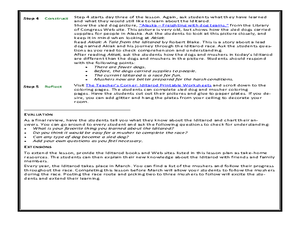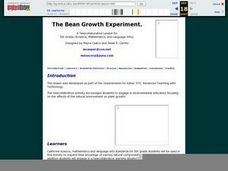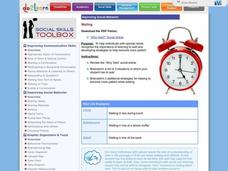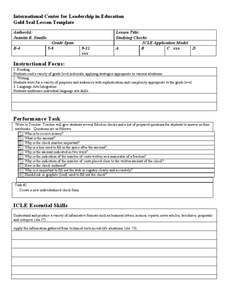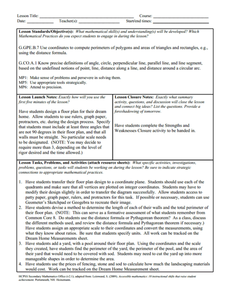Curated OER
The Amazing Inch and Measuring Up!
Fifth graders study the metric and customary systems of measuring length with rulers, meter / yardsticks, and tape measures. They determine area of polygons and surface area and volume of three-dimensional shapes. They list as many...
Curated OER
Estuary and Watershed
High schoolers investigate the San Francisco Bay Estuarine Research Reserve and watershed. In this estuary and watershed lesson plan, students complete 4 activities to better understand estuarine systems. They include studying the San...
Curated OER
Oh Deer! and English Learner Writing Extensions
Students follow deer through Yellowstone Park and record the number of deer from year to year. In this basic needs of deer lesson, students work in small groups and chart the number of deer each year and give explanations using as...
Curated OER
Fractions and Panes
Students recognize the fractional values of window panes as part of the whole window. In this window panes lesson, students listen to a story about window panes and sing a song. Students look at pictures of windows and write fractions...
Curated OER
Jr. Chef Club Making Brainy Breakfasts
Learners identify the benefits of eating a nutritious breakfast. In this nutrition activity, students read food labels to identify foods that are low in sugar. Learners create a healthy breakfast by using eggs and low-fat cheese.
Curated OER
The Iditarod: The Last Great Race
Students investigate the Iditarod. In this last great race lesson plan, students explore and research the Iditarod race which takes place in Alaska. Students explore a variety of websites and images to gather background information. A...
Curated OER
Scenario challenge
Fifth graders become familiar with the geography of New Hampshire and the importance of specific sites in history. In this New Hampshire lesson, 5th graders create a brochure including points of interest and showing distances between...
Curated OER
Tangram Puzzles
Students explore the origin of tangram. In this algebra lesson, students form different shapes and figures using tangram. They solve for the area of different shapes without using any geometric formulas, but the idea of tangram being put...
Curated OER
Cartesian Coordinates
Students investigate rational numbers through data analysis and statistics. For this algebra lesson, students represent, rename, compare and order rational numbers. They collect and represent data correctly on a graph.
Curated OER
Value Your Digits
Third graders work with place value. In this place value lesson, 3rd graders write three digit numbers and tell the place value of each number. They compare numbers and money, regroup, discuss the value of coins, and count money.
Curated OER
The Bean Growth Experiment
Fifth graders use modern technologies which allow them to gain a new, dynamic, and intersting understanding of themselves, their community, and the world. They focus on environmental education and the effect of the environment on plant...
Do2Learn
Tone of Voice and Volume Control
What level of voice is most appropriate for the classroom? Develop volume control in your learners with ASD with an activity that lets them know when they are using appropriate and inappropriate voice level.
Curated OER
Roman Bernardo: Solving Linear Equations
Mathematicians use an inquiry method to solve linear equations. In this linear equations instructional activity, students practice solving equations using addition, subtraction, multiplication and division. They solve multi-step...
Teach Engineering
Hydrogen-Oxygen Reaction Lab
High schoolers conduct an experiment using the reaction of hydrogen and oxygen. After pairs balance the chemical equation for making water, they mix different ratios of hydrogen and oxygen in a chemical reaction. Classmates...
Teach Engineering
Archimedes' Principle, Pascal's Law and Bernoulli's Principle
What do Pascal's law, Archimedes' Principle, and Bernoulli's Principle have to do with fluid mechanics? The included PowerPoint presentation provides the basic definitions and equations associated with the three. A set of homework...
Balanced Assessment
Red Dots, Blue Dots
Count the connections between dots. Young mathematicians come up with a method to determine the number of connections between pairs of dots. The assessment leads the class to determine the connections they can make when groups are...
Do2Learn
Waiting
Waiting can be hard for everyone, but for individuals with autism or other special needs, it can be confusing and frustrating. Lead a discussion in which students brainstorm times in their lives when they would need to wait, and help...
Teach Engineering
Concentrate This! Sugar or Salt...
Heat up your lessons on boiling points. The resource provides a three-part activity: first, groups find the boiling point of solutions; second, they create boiling point curves for salt and sugar solutions; and third, they mix a solution...
Kenan Fellows
The Newton Challenge
Make Newton proud. Scholars apply their understanding of forces and energy to an engineering design challenge. They learn about simple machines, create a presentation on Newton's laws, and develop a balloon-powered car.
Curated OER
Patterns Here, There, and Everywhere!
Upper graders access the Microsoft Word program and create patterns by utilizing certain keys on the keyboard. They create picket fences, smiley faces, and hearts. It seems that this lesson has as much to do with keyboarding skills as it...
Curated OER
Subtract Positive and Negative Integers
Review the concept of subtracting positive and negative integers. Learners review the rules for subtracting integers, use manipulatives to visualize the process, and complete an assessment.
Curated OER
Studying Checks
While on-line banking and electronic payments seem to be the way of the future, next-generation wage earners still need to understand the details of check writing. Here the focus is on the details of the check including what the...
Curated OER
Perimeter and Area
Students calculate the perimeter and area of given figures and lengths.
Curated OER
Case Study Two: Shark Dissection
Students read an article on sharks prior to beginning a dissection lab. As part of the lab, students identify differences between the shark anatomy and human anatomy and hypothesize why those differences exist.







